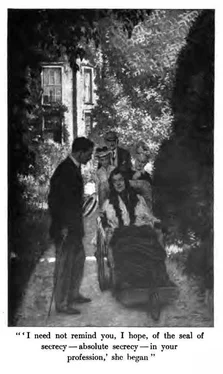"How?"
"Have you forgotten what comes after the depression?"
So then we waited about the small fire, and the dead air in the room presently filled and pressed down upon us with the sensation (but words are useless here) as though some dumb and bound power were striving against gag and bond to deliver its soul of an articulate word. It passed in a few minutes, and I fell to thinking about Mr. Baxter's conscience and Agnes Moultrie, gone mad in the well–lit bedroom that waited me. These reflections secured me a night during which I rediscovered how, from purely mental causes, a man can be physically sick; but the sickness was bliss compared to my dreams when the birds waked. On my departure, M'Leod gave me a beautiful narwhal's horn, much as a nurse gives a child sweets for being brave at a dentist's.
"There's no duplicate of it in the world," he said, "else it would have come to old Max M'Leod;" and he tucked it into the motor. Miss M'Leod on the far side of the car whispered, "Have you found out anything, Mr. Perseus?"
I shook my head.
"Then I shall be chained to my rock all my life," she went on. "Only don't tell papa."
I supposed she was thinking of the young gentleman who specialised in South American rails, for I noticed a ring on the third finger of her left hand.
I went straight from that house to Burry Mills Hydro, keen for the first time in my life on playing golf, which is guaranteed to occupy the mind. Baxter had taken me a room communicating with his own, and after lunch introduced me to a tall, horse–headed elderly lady of decided manners, whom a white–haired maid pushed along in a bath–chair through the park–like grounds of the Hydro. She was Miss Mary Moultrie, and she coughed and cleared her throat just like Baxter. She suffered—she told me it was a Moultrie castemark—from some obscure form of chronic bronchitis, complicated with spasm of the glottis; and, in a dead, flat voice, with a sunken eye that looked and saw not, told me what washes, gargles, pastilles, and inhalations she had proved most beneficial. From her I was passed on to her younger sister, Miss Elizabeth, a small and withered thing with twitching lips, victim, she told me, to very much the same sort of throat, but secretly devoted to another set of medicines. When she went away with Baxter and the bath–chair, I fell across a major of the Indian army with gout in his glassy eyes, and a stomach which he had taken all round the Continent. He laid everything before me; and him I escaped only to be confided in by a matron with a tendency to follicular tonsilitis and eczema. Baxter waited hand and foot on his cousins till five o'clock, trying, as I saw, to atone for his treatment of the dead sister. Miss Mary ordered him about like a dog.
"I warned you it would be dull," he said when we met in the smoking–room.
"It's tremendously interesting," I said. "But how about a look round the links?"
"Unluckily damp always affects my eldest cousin. I've got to buy her a new bronchitis–kettle. Arthurs broke her old one yesterday."
We slipped out to the chemist's shop in the town, and he bought a large glittering tin thing whose workings he explained.
"I'm used to this sort of work. I come up here pretty often," he said. "I've the family throat too."
"You're a good man," I said. "A very good man."
He turned towards me in the evening light among the beeches, and his face was changed to what it might have been a generation before.
"You see," he said huskily, "there was the youngest—Agnes. Before she fell ill, you know. But she didn't like leaving her sisters. Never would." He hurried on with his odd–shaped load and left me among the ruins of my black theories. The man with that face had done Agnes Moultrie no wrong.
We never played our game. I was waked between two and three in the morning from my hygienic bed by Baxter in an ulster over orange and white pyjamas, which I should never have suspected from his character.
"My cousin has had some sort of a seizure," he said. "Will you come? I don't want to wake the doctor. Don't want to make a scandal. Quick!"
So I came quickly, and led by the white–haired Arthurs in a jacket and petticoat, entered a double–bedded room reeking with steam and Friar's Balsam. The electrics were all on. Miss Mary—I knew her by her height—was at the open window, wrestling with Miss Elizabeth, who gripped her round the knees.
Miss Mary's hand was at her own throat, which was streaked with blood.
"She's done it. She's done it too!" Miss Elizabeth panted. "Hold her! Help me!"
"Oh, I say! Women don't cut their throats," Baxter whispered.
"My God! Has she cut her throat?" the maid cried out, and with no warning rolled over in a faint. Baxter pushed her under the wash–basins, and leaped to hold the gaunt woman who crowed and whistled as she struggled toward the window. He took her by the shoulder, and she struck out wildly:
"All right! She's only cut her hand," he said. "Wet towel quick!"
While I got that he pushed her backward. Her strength seemed almost as great as his. I swabbed at her throat when I could, and found no mark; then helped him to control her a little. Miss Elizabeth leaped back to bed, wailing like a child.
"Tie up her hand somehow," said Baxter. "Don't let it drip about the place. She"—he stepped on broken glass in his slippers, "she must have smashed a pane."
Miss Mary lurched towards the open window again, dropped on her knees, her head on the sill, and lay quiet, surrendering the cut hand to me.
"What did she do?" Baxter turned towards Miss Elizabeth in the far bed.
"She was going to throw herself out of the window," was the answer. "I stopped her, and sent Arthurs for you. Oh, we can never hold up our heads again!"
Miss Mary writhed and fought for breath. Baxter found a shawl which he threw over her shoulders.
"Nonsense!" said he. "That isn't like Mary;" but his face worked when he said it.
"You wouldn't believe about Aggie, John. Perhaps you will now!" said Miss Elizabeth. "I saw her do it, and she's cut her throat too!"
"She hasn't," I said. "It's only her hand."
Miss Mary suddenly broke from us with an indescribable grunt, flew, rather than ran, to her sister's bed, and there shook her as one furious schoolgirl would shake another.
"No such thing," she croaked. "How dare you think so, you wicked little fool?"
"Get into bed, Mary," said Baxter. "You'll catch a chill."
She obeyed, but sat up with the grey shawl round her lean shoulders, glaring at her sister. "I'm better now," she panted. "Arthurs let me sit out too long. Where's Arthurs? The kettle."
"Never mind Arthurs," said Baxter. "You get the kettle." I hastened to bring it from the side table. "Now, Mary, as God sees you, tell me what you've done."
His lips were dry, and he could not moisten. them with his tongue.
Miss Mary applied herself to the mouth of the kettle, and between indraws of steam said: "The spasm came on just now, while I was asleep. I was nearly choking to death. So I went to the window I've done it often before, without, waking any one. Bessie's such an old maid about draughts. I tell you I was choking to death. I couldn't manage the catch, and I nearly fell out. That window opens too low. I cut my hand trying to save myself. Who has tied it up in this filthy handkerchief? I wish you had had my throat, Bessie. I never was nearer dying!" She scowled on us all impartially, while her sister sobbed.
From the bottom of the bed we heard a quivering voice: "Is she dead? Have they took her away? Oh, I never could bear the sight o' blood!"
"Arthurs," said Miss Mary, "you are an hireling. Go away!"
It is my belief that Arthurs crawled out on all fours, but I was busy picking up broken glass from the carpet.
Читать дальше












